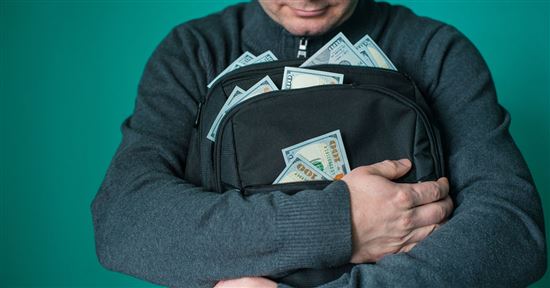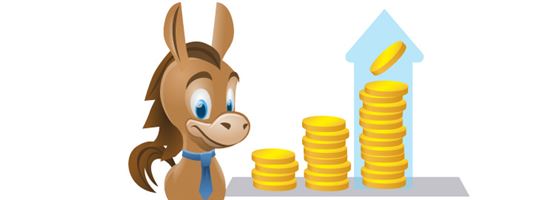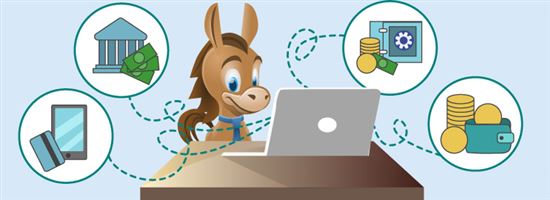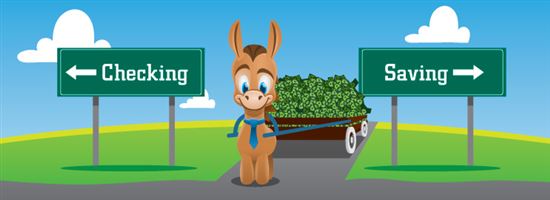Average Savings Account Interest
Ad Disclosure: This article contains references to products from our partners. We may receive compensation if you apply or shop through links in our content. This compensation may impact how and where products appear on this site. You help support CreditDonkey by using our links.
The average savings account interest rate is 0.6%. Many big banks offer even lower rates. Read this for the surprising truth about savings accounts.
 |
Don't open a savings account just anywhere. Do your research first. Interest on savings accounts is so small these days that every penny counts.
Read our guide to learn what you need to know about savings accounts before moving forward.
- Average Savings Account Interest Rates
- Best Savings Accounts
- What to Look for in a Savings Account
- How Much Should You Save?
- Pros & Cons of Traditional Banks
- Pros & Cons of Online Banks
- Savings Account vs Money Market
- Savings Account vs CDs
- Savings Account vs Checking
Average Savings Account Interest Rates
 |
| © CreditDonkey |
The national average interest rate on banking accounts is as follows:
- Savings accounts: 0.6%
- Money market accounts: 0.9%
- Checking accounts: 0.04%
Let's put this into perspective. You invest $1,000 in a savings account with a 0.6% APY. After 5 years, you'd walk away with $1,003. That's only $3 in interest over a 5-year period.
Luckily, many banks out there offer higher interest rates. Read on.
Best Savings Accounts
Today, the best savings accounts come from online banks. Online banks have less overhead so they pass the savings to you in form of higher interest rates.
Here are some of our favorite savings accounts.
CIT Bank Platinum Savings - 3.75% APY
- 3.75% APY with a balance of $5,000 or more
- 0.25% APY with a balance of less than $5,000
- $100 minimum opening deposit
- No monthly maintenance fee
- Member FDIC
UFB Portfolio Savings - Earn up to 3.26% APY
- Earn up to 3.26% APY.*
- No monthly maintenance fees.
- No minimum deposit required to open an account.
- Access your funds 24/7 with easy-to-use digital banking tools.
- Enjoy peace of mind with FDIC insurance up to the maximum allowance limit – Certificate #35546.
High-Yield Savings Premier - 3.80% APY
- No account fees
- Option to open individual or joint account
- FDIC insured up to $250,000 per depositor
- Only $500 minimum opening deposit
Each bank compounds interest differently. Some compound it daily, some monthly, and others yearly. Which is the best? Honestly, given the same interest rate, the difference is minimal.
Take for example, two savings accounts, each with an APR of 1.3%. One compounds interest daily, and one compounds monthly. They both return $1,067 at the end of 5 years. Don't focus on how frequently a bank compounds. Instead, focus on the APY and fees.
What to Look for in a Savings Account
 |
| © CreditDonkey |
The right savings account will differ for each person. Besides the APY, here are a few things to consider:
- Service fees. There are enough savings accounts out there that you should be able to find one with no service fees.
- Balance requirements. Some accounts have a required opening deposit and/or minimum balance or monthly deposit requirements. If you can meet it, it could be worth it for a higher APY (like CIT Bank's Savings Builder Account).
- Security. Only put your money in a bank that is FDIC insured. This means if the bank defaults, the government will pay you back the amount you had, up to $250,000.
- Flexibility. Most savings accounts allow electronic transactions. Some may offer an ATM card for more convenience. Pay close attention to what the bank offers.
The FDIC usually responds within one business day of a bank's failure. You'll receive your funds in one of two ways:
- The FDIC may open another account for you matching the amount of your account balance from the old account.
- The FDIC may issue you a check for the amount you lost, up to $250,000.
How Much Should You Save?
 |
| © CreditDonkey |
A savings account is liquid, so you have instant access to funds. This makes it ideal for emergency savings and short-term goals.
For an emergency fund, we recommend that you save 3-6 months worth of living expenses. For anything over that, there are other investment vehicles you could use to earn more interest. Too much money sitting idle in a savings account starts to lose value thanks to inflation.
Other reasons to use savings account include:
- Saving for a house down payment
- Saving for a car
- Saving for a wedding
- Saving for a vacation
- Putting tax money away for self-employed individuals
Read our detailed guide on how much you should save for various scenarios and goals.
No. As long as you choose a bank that is FDIC insured, savings accounts are very secure. If the bank defaults, the government will pay back what is in your account (up to $250,000). You will always earn the advertised APY. High-yield savings accounts are very secure places to grow your money.
Pros and Cons of Traditional Banks
 |
| © CreditDonkey |
Your local bank likely provides several savings account options. Local banks are convenient, but it usually comes at a cost. Here are the pros and cons of traditional banks.
Pros:
- Can talk to a banker face-to-face
- A large variety of services, including credit cards, loans, and other investment vehicles
- Can access your funds 24/7 at the bank's ATM through a linked checking debit card
Cons:
- High overhead means very low interest rates - as low as just 0.1% APY.
- Higher minimum daily balances to cover their overhead
- More fees to keep their operation running
Some banks do offer incentives for opening a savings account. It's important to read the fine print, though. They usually require a minimum opening balance.
Pros and Cons of Online Banks
 |
| © CreditDonkey |
Online savings accounts offer several benefits but are less convenient. Here are the pros and cons of online banks.
Pros:
- Higher APYs
- Lower overhead means no monthly service fees
- Lower opening balance requirements
Cons:
- No in-person customer service
- Longer hold times before funds are available to use
- Small selection of products (for example, a lot of online banks don't offer checking)
Banks pay interest on savings accounts because they use your money to lend to others. Savings accounts are less liquid. The average borrower leaves their funds in the account to grow interest. The bank uses these funds to make loans to other clients and charges interest. They then pay you a portion of that interest, while keeping the rest for their own profits.
Banks determine their interest rates, using the Fed's rate as guidance. They'll adjust the rate based on factors like competition in the area, their overhead, and interest they receive from lending to other clients.
Savings Account vs Money Market
 |
| © CreditDonkey |
Money market accounts and savings accounts are very similar. Both allow only 6 withdrawals or transfer per month.
The largest difference is how you access the funds. Money market accounts may offer more flexibility. It's kind of a cross between a checking and savings account.
Some features may include:
- Check writing privileges
- ATM card
- Online bill pay
- Mobile check deposits
Money market accounts usually require a larger opening deposit and monthly balance, in exchange for a higher APY. But in some cases, some savings accounts offer a higher APY in exchange for less flexibility.
UFB Portfolio Money Market - Earn up to 3.26% APY
- Earn up to 3.26% APY*
- Enjoy no monthly maintenance fees with a $5,000.00 balance, otherwise fee is $10.00 per month.
- Access your funds 24/7 with easy-to-use digital banking tools.
- Have peace of mind with FDIC insurance up to the maximum allowable limit – Certificate #35546.
Savings Account vs CDs
Another good investment vehicle for savings is Certificate of Deposits. The difference between CDs and a savings account is liquidity.
CDs require you to deposit a certain amount of money for a specific time. You cannot add more money or withdraw early. For example, a 12-month CD means you can't touch your money for 12 months. If you do, you'll pay a penalty.
In exchange for the commitment, you will receive a guaranteed fixed interest rate. The longer the term, the higher the APY.
On average, you can expect to receive around 0.28% on a 12-month CD. The longer you commit to tie up your money, the more interest you'll make. The average 24-month CD rate is 0.42% and the average 48-month CD rate is 0.65%. But online banks also offer much higher CD rates.
Certificate of Deposit
- Up to 4.10% APY
- Up to 5 years
- $0 minimum opening deposit
- Daily Compounding Interest
- FDIC Insured
Online CDs
- Up to 3.85% APY
- Up to 5 years
- $0 minimum opening deposit
- Daily Compounding Interest
- FDIC Insured
High Yield CD
- Up to 3.76% APY
- Up to 5 years
- $1,000 Minimum Opening Deposit
- No monthly service fee
- FDIC insured
Savings Account vs Checking
 |
| © CreditDonkey |
A checking account is for storing funds for day-to-day expenses. Some features of checking accounts are:
- Unlimited deposits and withdrawals without penalty
- Debit card for purchases
- ATM access for withdrawals (though there may be fees if you go out-of-network)
- Direct deposit, check writing, and online bill pay
- May have a balance requirement in order to waive service fees
Most banks don't offer interest on checking accounts. So if you have extra funds you don't need for daily living, it's better to put them into a savings account with interest.
See our list of our top high-yield checking accounts.
If you open a checking and savings account at the same bank, you may be able to link the accounts. You can make automatic deposits to your savings accounts. And if you accidentally overdraft your checking account, the linked savings account can cover it.
The Bottom Line
A savings account is a secure place to store funds for emergencies and short-term goals. Nowadays, many online banks offer higher interest to help your money grow a little. Your money will sit and collect interest, yet be available if you need it.
Note that federal law prohibits you from withdrawing funds from your savings account more than 6 times per month. This can work to your favor, as it doesn't provide easy access to your funds.
Sources and References:
Write to Kim P at feedback@creditdonkey.com. Follow us on Twitter and Facebook for our latest posts.
Note: This website is made possible through financial relationships with some of the products and services mentioned on this site. We may receive compensation if you shop through links in our content. You do not have to use our links, but you help support CreditDonkey if you do.




